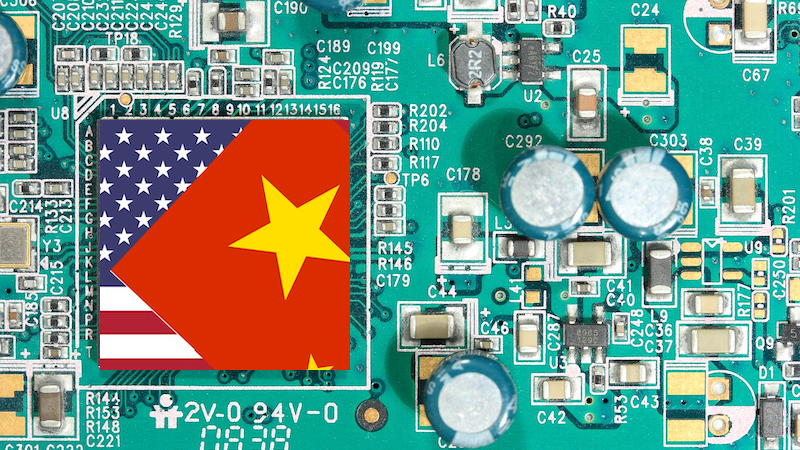Tech
ASML’s Dilemma: Balancing AI Chip Innovation In Times Of USA-China Tech War – Analysis

In the summer, the United States pushed its allies, including the Netherlands, to tighten export rules on semiconductor equipment manufactured by Advanced Semiconductor Materials Lithography (ASML) Holding NV—a joint venture between Philips and ASM International and a Dutch multinational corporation founded in 1984—being sent to China. The US government took this step to limit China’s access to advanced technology that could strengthen its military power.
In response, the Dutch government recently regained control over the company’s exports, while still following US policies. This led to stopping ASML’s shipments of advanced chip-making machines to China. The decision reflects the ongoing geopolitical tensions over technology exports and the balance between national security and economic interests.
ASML: Pioneering Advanced Chip-Making Tech
ASML focuses on developing and making photolithography machines, which are essential for producing computer chips. ASML’s unique EUV lithography technology works on a very small scale, using light with a wavelength of just 13.5 nanometres (nm) to print microchips. A 13.5-nm chip is mainly used for making advanced processors for such devices as smartphones and computers. It enables smaller, faster and more efficient chips used in AI, high-performance computing and mobile devices.
Main Insight—1
US efforts to maintain restrictions on ASML’s trade with China are highly likely to heighten tensions with the Netherlands.
In mid-June, a US official visited Japan after a meeting with the Dutch government to push for further limits on China’s ability to develop advanced technology, reflecting continuous US pressure on its allies. This was reported by Reuters and the UK investigative media, Grey Dynamics.
By July 2023, Japan—home to such major chip equipment manufacturers as Nikon Corp and Tokyo Electron—implemented export restrictions on 23 types of equipment. These include machines used for depositing films on silicon wafers and those used to etch intricate circuits, aligning Japan with US policy.
Meanwhile, the Dutch government introduced licensing requirements for ASML’s deep ultraviolet (DUV) semiconductor equipment. DUV technology, essential for manufacturing advanced chips, uses light with a wavelength of 193 nm to etch patterns onto silicon wafers. As a result, ASML warned Chinese customers that they would not receive its most advanced equipment after January 1, 2024. Additionally, the US imposed restrictions on other DUV machines used in certain Chinese factories, citing US components in ASML’s systems as the reason for its jurisdiction.
In early-September, Chinese state media and officials warned the Netherlands and Japan about potential retaliation if they complied with Washington’s request to tighten their chip export controls against China. According to a report by Asia Times, The Global Times, a newspaper aligned with the Chinese Communist Party, stated that, if the Dutch government halted maintenance services for advanced DUV lithography machines in China, Beijing would respond with counter-measures. These could include trade restrictions, finding new suppliers, or reassessing its partnerships with the Netherlands on a global scale.
China is also increasing pressure on Japan. A Bloomberg report highlighted that senior Chinese officials had warned Japanese companies that Beijing would retaliate if Japan strengthened its chip export controls. Toyota Motors executives have reportedly expressed concerns that China might restrict Japan’s access to critical minerals, which are crucial for car manufacturing.
In recent months, the Biden Administration has faced resistance to its efforts to restrict China’s access to advanced chips, according to a Bloomberg report on July 17. The Administration has informed its allies that it may consider using stricter trade measures if such companies as Tokyo Electron Ltd and ASML Holding NV continue to supply China with advanced semiconductor technologies.
To increase pressure on its allies, the US is considering applying the foreign direct product rule (FDPR), according to sources familiar with the discussions. This rule allows the US to enforce export controls on foreign-made products that incorporate even a small amount of American technology. Essentially, it means that, if a product includes any US-based technology, even in a minor way, the US can restrict its sale to China.
The Dutch government has regained control over the export of two specific ASML machines—the 1970i and 1980i DUV lithography tools that are mid-range in ASML’s product line. These machines were previously restricted by the US because they contain US parts. However, according to a Reuters report from September 6, 2024, the Dutch government now has the authority to make its own decisions about selling these machines, instead of just following US rules. This gives the Netherlands more say in its export policies, but the machines will still require special licences for sale and the rules are aligned with US concerns.
The US Department of Commerce updated its export rules and the Dutch government adopted similar wording in its regulations regarding ASML’s lithography equipment.
ASML’s machines use lasers to create the tiny circuits found in chips. Interest in the 1970i and 1980i machines has grown, especially after such Chinese companies as SMIC successfully used them to make advanced chips through a process called ‘multi-patterning’, where silicon wafers are passed through DUV machines multiple times.
Main Insight—2
It is likely that the Netherlands will follow US trade restrictions, even though this could lead to a loss of considerable export revenue. This decision is influenced by several factors, as reported by Grey Dynamics (based on verified sources):
- Western countries consider microchip manufacturing a critical issue for national security.
- In recent months, the Dutch government has been involved in discussions with the US to synchronize their trade policies.
- On September 6, Dutch Trade Minister Reinette Klever said, “I’m making this decision for our safety,” while announcing updates to the Netherlands’ trade policies in line with US restrictions.
- On September 7, China voiced its dissatisfaction with the Dutch government’s decision to expand export controls on ASML’s 1970i and 1980i DUV immersion lithography machines.
Main Insight—3
These trade restrictions are expected to negatively affect ASML’s stock price for the following reasons, which have been confirmed by reliable sources at Grey Dynamics.
- On September 1, Dutch Prime Minister Dick Schoof assured stakeholders that the country’s economic interests, including those of ASML, would be protected. However, concerns about potential economic consequences are growing.
- The new export licence rules introduced by the Dutch government will limit ASML’s ability to send certain products to China.
- On September 4, ASML’s CEO mentioned that the US push to restrict equipment exports to China was driven by economic reasons.
- On September 6, ASML’s stock dropped by 1.6%, trading at 708.4 euros at 9:15 am (GMT).
Analytical Summary
One can be highly confident that the ongoing US pressure to limit ASML’s trade with China is increasing tensions between the US and the Netherlands and will, possibly, affect ASML’s assets. This conclusion is drawn from a mix of local and international news reports, official Dutch government statements and financial data showing ASML’s market trends.
It is also believed that the Netherlands will continue to follow US trade policies due to shared national security concerns. However, if this assumption proves wrong, one might see the Dutch government pushing back against US pressure and, possibly, negotiating trade terms that benefit ASML more.
After exploring the possibility that the Netherlands may put its economic interests ahead of aligning with US policies, it was ruled out because recent actions and statements from Dutch officials have focussed on national security and supporting US policies. More information about the internal discussions within the Dutch government about their trade policy choices would help reduce uncertainty and give a clearer picture of what to expect in future.










